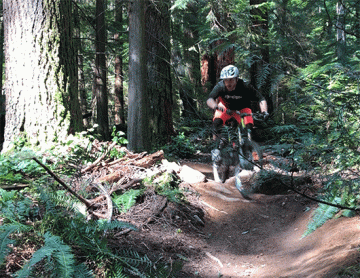Walking modification for knee osteoarthritis: wearable sensors, biomechanics, and motor learning.
I first gained exposure to biomechanical research during my undergraduate studies. At that time, I was primarily interested in how changes to exercise biomechanics could improve athletic performance and safety. Once I began my MSc, I turned my focus toward applying these concepts in clinical populations, specifically knee osteoarthritis. Knee osteoarthritis is a painful, functionally limiting, and progressive disease. Unfortunately, people often live with the disease for many years. Thus, managing symptoms and slowing progression is an important clinical objective. Various aspects of walking biomechanics, including high knee joint forces, are a key risk factor for pain and disease progression. Fortunately, knee joint forces can be modified.
To date, most of my work has examined the biomechanical affects of modifying walking motion. Small changes to foot motion (toeing in or out) when walking, can redistribute knee joint forces away from the diseased regions of the joint. However, the process of learning this walking modification is not well understood. Moreover, we know little about real-world walking biomechanics in people living with knee osteoarthritis. Without this important knowledge, it is difficult to know if this approach to managing knee osteoarthritis is clinically feasible.
My doctoral research blends the worlds of motion analysis, movement modifications, and motor learning to address these questions. Wearable-sensor-based motion analysis allows for the objective assessment of walking biomechanics, outside of the lab setting. To assess motor learning, I will measure the permanence, generalizability, and automaticity of a walking modification, over the course of an intervention. Pain has the potential to negatively affect motor learning. However, pain is highly variable in knee osteoarthritis, making it difficult to examine this effect. Therefore, in a separate study, I will be using an experimental pain model to examine how pain alters short-term motor learning, in healthy adults.
As a dual-program student, I am very excited to blend my clinical and research training. The MPT/PhD program provides the unique opportunity to develop clinically relevant research and strong evidence-informed clinical practice skills, simultaneously. Although my research activities occupy most of my time, I am a passionate mountain biker, skier, and overall outdoor enthusiast. Professionally, I work as a strength and conditioning coach, both in a private and public setting. Ultimately, my career goal is to combine my passion for exercise, biomechanics, and rehabilitation to help people living with musculoskeletal diseases live active and fulfilled lives.
I love to connect with other passionate researchers and clinicians to discuss metascience, rehabilitation, and exercise! Follow me on Twitter: @JesseCharlton_ or Research Gate: Jesse_Charlton
